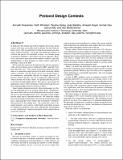Protocol design contests
Author(s)
Winstein, Keith; Das, Somak; Ma, Joshua; Balakrishnan, Hari; Sivaraman Kaushalram, Anirudh; Varley, Pauline P.; Batalha, Joao; Goyal, Ameesh K.; ... Show more Show less
DownloadBalakrishnan_Protocol Design.pdf (854.1Kb)
OPEN_ACCESS_POLICY
Open Access Policy
Creative Commons Attribution-Noncommercial-Share Alike
Terms of use
Metadata
Show full item recordAbstract
In fields like data mining and natural language processing, design contests have been successfully used to advance the state of the art. Such contests offer an opportunity to bring the excitement and challenges of protocol design---one of the core intellectual elements of research and practice in networked systems---to a broader group of potential contributors, whose ideas may prove important. Moreover, it may lead to an increase in the number of students, especially undergraduates or those learning via online courses, interested in pursuing a career in the field.
We describe the creation of the infrastructure and our experience with a protocol design contest conducted in MIT's graduate Computer Networks class. This contest involved the design and evaluation of a congestion-control protocol for paths traversing cellular wireless networks. One key to the success of a design contest is an unambiguous, measurable objective to compare protocols. In practice, protocol design is the art of trading off conflicting goals with each other, but in this contest, we specified that the goal was to maximize $\log(\mbox{throughput}/\mbox{delay})$. This goal is a good match for applications such as video streaming or videoconferencing that care about high throughput and low interactive delays.
Some students produced protocols whose performance was better than published protocols tackling similar goals. Furthermore, the convex hull of the set of all student protocols traced out a tradeoff curve in the throughput-delay space, providing useful insights into the entire space of possible protocols. We found that student protocols diverged in performance between the training and testing traces, indicating that some students had overtrained ("overfitted") their protocols to the training trace. Our conclusion is that, if designed properly, such contests could benefit networking research by making new proposals more easily reproducible and amenable to such "gamification," improve networked systems, and provide an avenue for outreach.
Date issued
2014-07Department
Massachusetts Institute of Technology. Computer Science and Artificial Intelligence Laboratory; Massachusetts Institute of Technology. Department of Electrical Engineering and Computer ScienceJournal
ACM SIGCOMM Computer Communication Review
Publisher
Association for Computing Machinery (ACM)
Citation
Anirudh Sivaraman, Keith Winstein, Pauline Varley, Joao Batalha, Ameesh Goyal, Somak Das, Joshua Ma, and Hari Balakrishnan. 2014. Protocol design contests. SIGCOMM Comput. Commun. Rev. 44, 3 (July 2014), 38-44.
Version: Author's final manuscript
ISSN
01464833
1943-5819